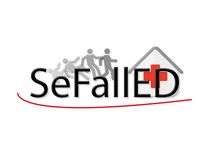SeFallED
SeFallED
SeFallED - Sentinel Fall presenting to the Emergency Department directly discharged: trajectories and needs as basis for the development of targeted interventions
Falls and bone fractures are among the five most common causes leading for the loss of independence in Germany. Falls can lead to restrictions in individual functionality, independence, everyday life management, social participation and thus quality of life of older people. Furthermore, the treatment of falls is linked to enormous costs for the health care system. Therefore, it is important to prevent further falls by reducing fall risks. A special risk group that does not receive secondary prevention are older people who present to the emergency department after a fall, but for whom the severity of the injury does not require hospitalisation.
The aim of the “SeFallED” project is to identify and predict long-term trajectories in terms of independence to perform activities of daily living, functional performance, physical activity and the fall risk profile of this at-risk group. Therefore, patients who have been treated in the emergency department because of a fall, but are discharged within 72 h are recruited. In home and gait lab visits, a comprehensive geriatric assessment, gait analyses with and without perturbations on a treadmill, are used to analyse fall risk factors and the individual functional trajectories. Based on these comprehensive insights a statistic prediction model is generated.
It is also of importance for the team to involve the patients and their caregivers in the research process in a qualitative approach and to assess their needs, preferences and barriers to participate in fall prevention programmes. The sum of these results forms the starting point for the selection of already existing and the development of new intervention strategies to prevent falls, or to minimise the individual risk of falling.
Advisory Board
Through the eyes of those affected
They are neither test subjects nor researchers in the traditional sense - and yet they have an important role to play in the SeFallED study: a total of six older people are involved in the research project as members of the advisory board. Scientists at the process of older individuals who have suffered a fall - a painful experience that the advisory board members also had to go through.
"I had a bad fall while jogging at the end of June 2020. It was a big shock and I had to have several operations on my face," says Margrit Pape. The accident is one of the reasons why she now has a fixed monthly appointment at the university. This is when the SeFallED advisory board, of which the 74-year-old is a member, meets and discusses upcoming surveys and evaluations as part of the project with the other advisory board members and researchers.
Dr. Tim Stuckenschneider conducts research in the Division of Geriatrics at the Department of Health Services Research. "We always get the perspective of those affected from the advisory board members - it's time-consuming, but also very valuable," he says. With their advice, the senior citizens actively influence the study. After the exchange with the advisory board, the researchers adapted the course of their interviews and examinations so that the study participants, who were also older, had more time for breaks. In addition, the advisory board members tested the planned gait analysis, which takes place on a special treadmill, before the start of the study. The treadmill simulates challenging everyday situations such as braking a bus.
You can find the full article here.
(From the UOM Newsletter issue 4/ November 2023)
Fall prevention in Oldenburg
Fall prevention in Oldenburg
Exchange between researchers and citizens at a kick-off event for the 2nd project phase
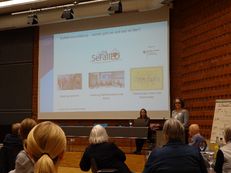
On July 6, 2023, the kick-off event for the 2nd project phase of the SeFallED fall project took place at the Carl von Ossietzky University of Oldenburg under the direction of Prof. Dr. med. Selected citizens were invited to discuss the topic of fall prevention. In addition to the project team, 29 citizens and experts in the field of fall prevention or senior citizen work from Oldenburg and the surrounding area took part.
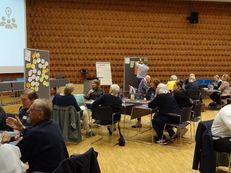
The "SeFallED" project, which is funded by the Federal Ministry of Education and Research (BMBF), is currently in its first project phase, in which, among other things, the long-term progression of people after a fall is being investigated. People aged 60 and over who receive outpatient care at the Oldenburg Clinic or the Evangelical Hospital Oldenburg after a fall are invited to take part. The people who have fallen are then visited at home four times over a period of 24 months and, among other things, carry out various movement exercises and complete questionnaires.
A follow-up application for a 2nd project phase (expected from October 2024) is currently being prepared, which will focus on the evaluation of customized fall prevention offers. In addition to the cooperation already established in the project with an advisory board consisting of six Oldenburg residents aged 60 and over with personal experience of falls, people who have already fallen and their relatives have also been asked about their own opinions and experiences in small discussion groups in the past. In preparation for the follow-up application, it was important to the SeFallED project team to involve Oldenburg citizens and experts in the field of fall prevention and senior citizen work as early as possible. In this way, practical knowledge from Oldenburg can flow directly into further project planning. In addition, contacts can be established to enable later cooperation.
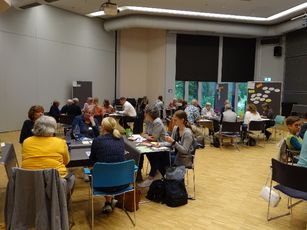
After the ongoing study was presented to the participants, citizens and experts from Oldenburg and the surrounding area came together in various discussion rounds to discuss how the follow-up application could be adapted to current Oldenburg practice. The focus was particularly on the exchange of information on existing or required services for people who have fallen in Oldenburg and the surrounding area. Furthermore, possibilities for cooperation between various specialists were discussed together with the university's researchers. Thematically, the offers focused on aspects such as exercise, counseling as well as digital and everyday possibilities. However, there was also room to contribute your own ideas at a free topic table.
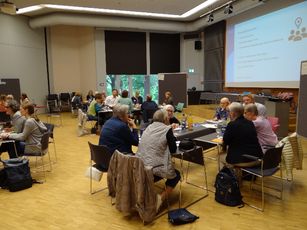
At the end of the event, the researchers and participants agreed that the personal and direct exchange between theory and practice is valuable in order to be able to develop targeted offers for Oldenburg residents. These structures will also be used in the future and during the second project phase.
A summary of the content-related results of the individual groups can be found here.
Publications
-

-
 Paper: Stuckenschneider et. al BMC Geriatrics Stuckenschneider, Tim; Schmidt, Laura; Speckmann, Elisa-Marie; Koschate, Jessica; Zieschang, Tania (2023): Recruiting patients for falls prevention in the emergency department – worth the challenge. In: BMC Geriatrics 23 (1). DOI: 10.1186/s12877-023-04607-5; https://doi.org/10.1186/s12877-023-04607-5
Paper: Stuckenschneider et. al BMC Geriatrics Stuckenschneider, Tim; Schmidt, Laura; Speckmann, Elisa-Marie; Koschate, Jessica; Zieschang, Tania (2023): Recruiting patients for falls prevention in the emergency department – worth the challenge. In: BMC Geriatrics 23 (1). DOI: 10.1186/s12877-023-04607-5; https://doi.org/10.1186/s12877-023-04607-5

